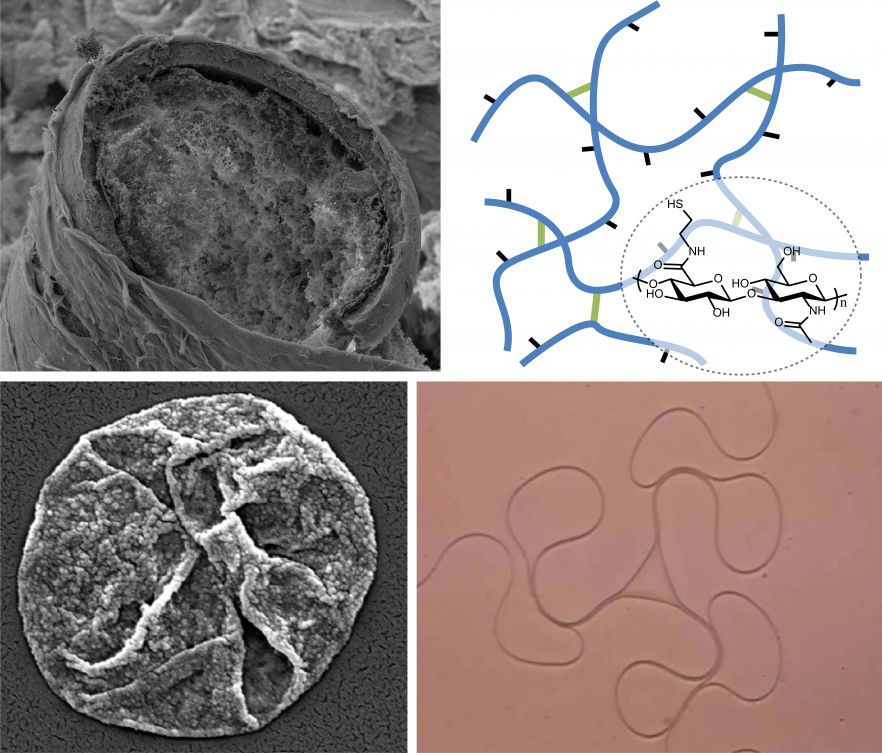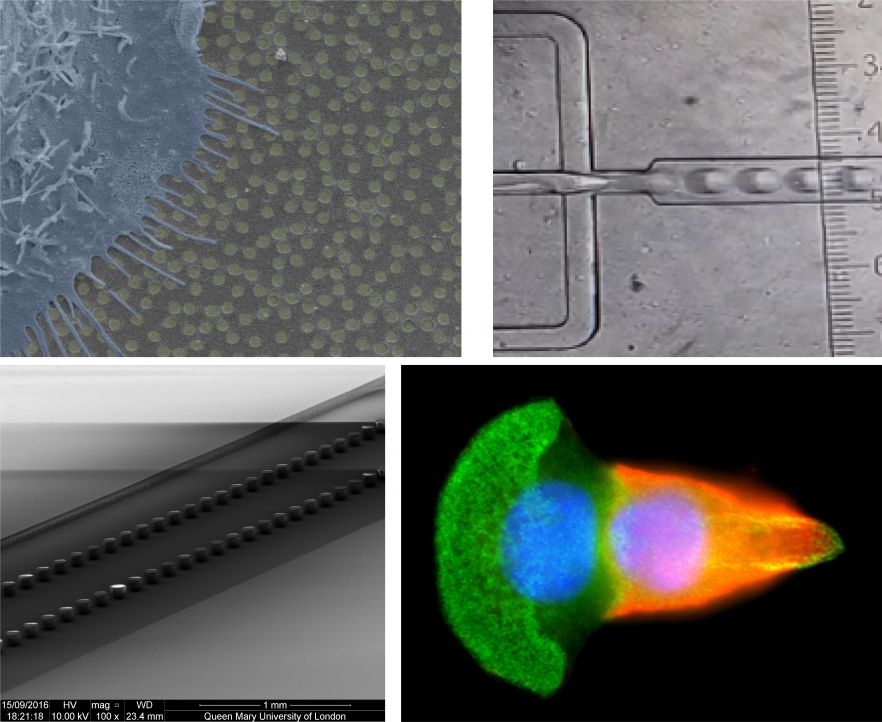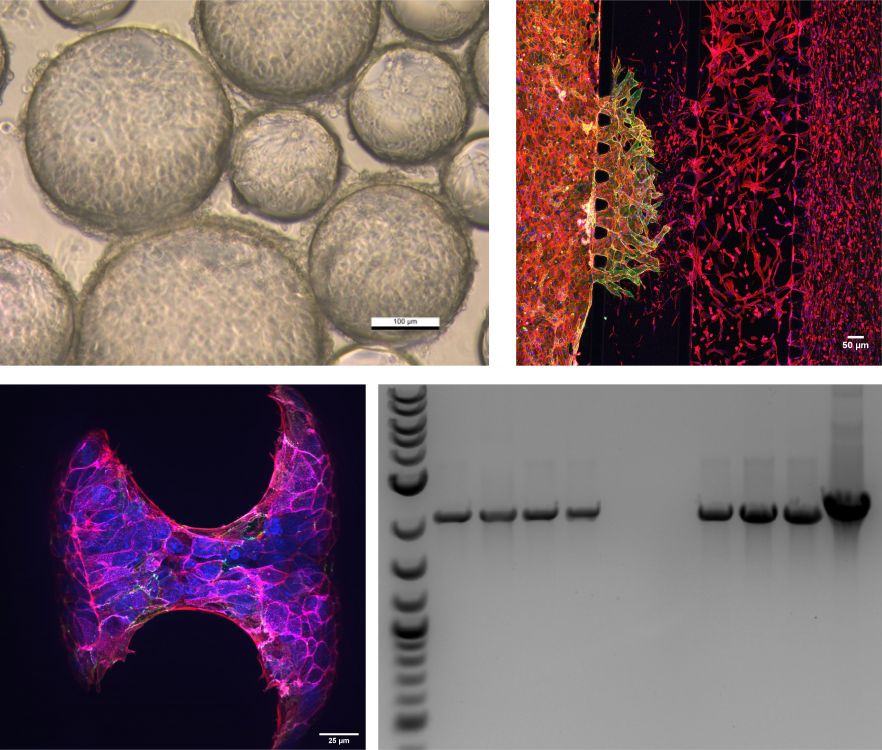Expertise and Facilities
 Structured soft matter. Our research includes a broad portfolio of soft matter projects, from self-assembled peptides and hydrogels to polymer brushes, self-assembled monolayers and polyelectrolyte multilayers. Our expertise spans from the synthesis of this range of soft matter systems to their characterisation (structural, mechanical, responsive), in the liquid state, in suspensions, at interfaces or in the dry state. These materials find a broad range of applications, from drug delivery and gene delivery, to tissue engineering and biosensors. In addition, the design of the responsive properties of these materials and soft interfaces is enabling novel emerging behaviours to be achieved (e.g. self-propelling, cell responsiveness, biosensing and smart delivery).
Structured soft matter. Our research includes a broad portfolio of soft matter projects, from self-assembled peptides and hydrogels to polymer brushes, self-assembled monolayers and polyelectrolyte multilayers. Our expertise spans from the synthesis of this range of soft matter systems to their characterisation (structural, mechanical, responsive), in the liquid state, in suspensions, at interfaces or in the dry state. These materials find a broad range of applications, from drug delivery and gene delivery, to tissue engineering and biosensors. In addition, the design of the responsive properties of these materials and soft interfaces is enabling novel emerging behaviours to be achieved (e.g. self-propelling, cell responsiveness, biosensing and smart delivery).
 Nano/micro-fabrication. We have access to and develop a range of techniques allowing the nano/microfabrication of materials. This includes 3D printing (extrusion, SLA, fused filament), photolithography, soft lithography, e-beam lithography, NanoFrazor, DNA origami, colloidal/electrospun fibre nanolithography. Such structuring is investigated and confirmed via high resolution imaging techniques, ranging from electron microscopy, confocal microscopy and super-resolution microscopy, to photoelectrochemical imaging and force probe microscopy. The structured materials and interfaces generated have broad applications, from tissue engineering and biosensing to electonics and emerging applications in the field of renewable energy.
Nano/micro-fabrication. We have access to and develop a range of techniques allowing the nano/microfabrication of materials. This includes 3D printing (extrusion, SLA, fused filament), photolithography, soft lithography, e-beam lithography, NanoFrazor, DNA origami, colloidal/electrospun fibre nanolithography. Such structuring is investigated and confirmed via high resolution imaging techniques, ranging from electron microscopy, confocal microscopy and super-resolution microscopy, to photoelectrochemical imaging and force probe microscopy. The structured materials and interfaces generated have broad applications, from tissue engineering and biosensing to electonics and emerging applications in the field of renewable energy.
 Biomanufacturing and bioprocessing. Within our centre, we develop a broad range of platforms for the production of biological systems (proteins, cells, tissues). For such design and applications, we engineer 3D bioreactors and associated microcarriers, organ-on-chip systems capturing tissue structure and function with increasing complexity, and high through put screening platforms. Our work focuses on stem cell manufacturing, but also the development of synthetic biology and other recombinant protein-based systems and the use of resulting materials for the engineering of soft materials to be used as tissue engineering scaffolds or as biotherapeutics. Our centre has also built unique strength in the field of molecular sieving for exactmer production (polymers, RNA). Finally, our centre hosts a range of projects focusing on biomass production and recycling.
Biomanufacturing and bioprocessing. Within our centre, we develop a broad range of platforms for the production of biological systems (proteins, cells, tissues). For such design and applications, we engineer 3D bioreactors and associated microcarriers, organ-on-chip systems capturing tissue structure and function with increasing complexity, and high through put screening platforms. Our work focuses on stem cell manufacturing, but also the development of synthetic biology and other recombinant protein-based systems and the use of resulting materials for the engineering of soft materials to be used as tissue engineering scaffolds or as biotherapeutics. Our centre has also built unique strength in the field of molecular sieving for exactmer production (polymers, RNA). Finally, our centre hosts a range of projects focusing on biomass production and recycling.
Facilities

SEMS offers recently renovated facilities in the field of materials synthesis and characterisation, as well as molecular biology, cell culture and tissue engineering (including bioreactors). Students in our cohort will also have access to nano/microfabrication in SEMS, Mile End (including through Nanoforce) and at the CREATE laboratory in the Blizard Institute. Students will have access to nanomaterials characterisation facilities in the NanoVision Centre and to the Interface Laboratory in SEMS.

